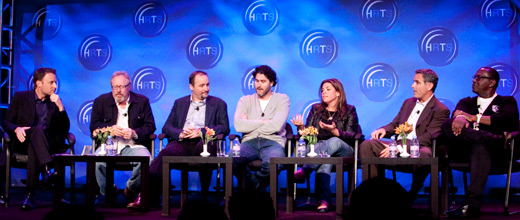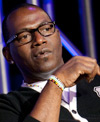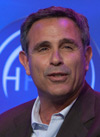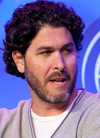HRTS eNews - 04/30/2010 (Plain Text Version)
In this issue:
HRTS News
•
A conversation with Brian Roberts, moderated by Peter Chernin
•
Save the Date: SOTI (State of the Industry) presented by Academy of Television Arts & Sciences
•
The Hitmakers: Cable Reality Event Recap
Member Profiles
•
Carolina Lightcap
HRTS Online
•
The Hitmakers: Cable Reality luncheon pics and vid online
Member News
•
Welcome New Members
JHRTS
•
JHRTS News & Announcements
About HRTS
•
Officers, Board of Directors, Staff
The Hitmakers: Cable Reality Event Recap
Keepin' It Real

Things got really real on April 21, 2010 at the HRTS Cable Reality luncheon at the Beverly Hilton. An entertaining, boisterous panel was moderated by “Bachelor” host Chris Harrison, who was pitch perfect in his interactions with panelists Thom Beers (“Ice Road Truckers”), Mark Cronin (“Rock of Love”), Jason Goldberg (“Punk’d”), Randy Jackson (“America’s Best Dance Crew”), Craig Piligian (“The Ultimate Fighter”) and Sally Ann Salsano (“Jersey Shore”).
Event Chair Sean Perry brought together this group of all-stars and helped set the tone in his opening remarks when he commended Piligian on his show “Ghost Hunters”, a continuing hit despite never having found even one ghost. Piligian offered a colorful response, leading Perry to check his watch and say “first expletive from Craig Piligian: two minutes, thirty seconds”. From that moment on, everyone in the room knew it was going to be a lively event, one to remember.
 Harrison jumped right in and announced that he was happy to serve as moderator since “Jeff Probst hosted this last year and he won an Emmy, so I’m hoping”. Jackson had to leave early to make a taping of “Idol Gives Back”, Harrison explaining this to the audience as “Randy’s got to get on over to watch Crystal Bowersox cry tonight”.
Harrison jumped right in and announced that he was happy to serve as moderator since “Jeff Probst hosted this last year and he won an Emmy, so I’m hoping”. Jackson had to leave early to make a taping of “Idol Gives Back”, Harrison explaining this to the audience as “Randy’s got to get on over to watch Crystal Bowersox cry tonight”.
 How are things going in the reality business? Cronin said that things are a bit better on the cable side than on the broadcast side, since “networks only have ad sales to look to and they’ve had a rough time of it, but cable has two revenue streams”. Jackson said that he likes working in cable, where “you can definitely be a little more creative” since the broadcast networks are trying to serve “audiences from five to a hundred-and-five”. Jackson also said that “American Idol” is a show you can watch with the whole family, leading Salsano to quip “I don’t ever get that”, though Harrison did let her know that “my 6-year-old daughter has learned so much from ‘Jersey Shore’”.
How are things going in the reality business? Cronin said that things are a bit better on the cable side than on the broadcast side, since “networks only have ad sales to look to and they’ve had a rough time of it, but cable has two revenue streams”. Jackson said that he likes working in cable, where “you can definitely be a little more creative” since the broadcast networks are trying to serve “audiences from five to a hundred-and-five”. Jackson also said that “American Idol” is a show you can watch with the whole family, leading Salsano to quip “I don’t ever get that”, though Harrison did let her know that “my 6-year-old daughter has learned so much from ‘Jersey Shore’”.
 Beers compared reality shows on cable to those on broadcast, saying that his show “Ice Road Truckers” would not likely have worked on NBC, his pitch being “I wanna do this thing about these five guys in a truck driving in a straight line at fifteen miles-an-hour by themselves”. Cronin said that one major difference is that in cable “if you have a successful show there that means you’re a big fish in that pond” whereas on broadcast you are always competing with scripted shows. Goldberg said that he gives “a lot more credit to the network buyers” since it is “much more difficult to get to the mass audience”.
Beers compared reality shows on cable to those on broadcast, saying that his show “Ice Road Truckers” would not likely have worked on NBC, his pitch being “I wanna do this thing about these five guys in a truck driving in a straight line at fifteen miles-an-hour by themselves”. Cronin said that one major difference is that in cable “if you have a successful show there that means you’re a big fish in that pond” whereas on broadcast you are always competing with scripted shows. Goldberg said that he gives “a lot more credit to the network buyers” since it is “much more difficult to get to the mass audience”.
 Asked whether she worries about edgy content and alienating advertisers, Salsano said that “at the end of the day, if there’s numbers then people will want to get on board”. Piligian said that it’s important to find advertisers who understand and believe in your show, relating that the first season of “The Ultimate Fighter” was tough and yet his advertisers stuck with him, the show having since gone on to complete twelve successful seasons.
Asked whether she worries about edgy content and alienating advertisers, Salsano said that “at the end of the day, if there’s numbers then people will want to get on board”. Piligian said that it’s important to find advertisers who understand and believe in your show, relating that the first season of “The Ultimate Fighter” was tough and yet his advertisers stuck with him, the show having since gone on to complete twelve successful seasons.
The panel discussed how to measure a hit, with Beers talking about a series on Discovery that earned decent though not spectacular ratings “but when you looked at the raw information coming in, it delivered a 13% brand new audience” to the network and was also the #1 download on Xbox LIVE. On the topic of ratings, Harrison wondered if there could ever be another “American Idol”-sized hit.  Jackson said that there could be another show that successful only if it’s real and it’s relatable, adding music is a great uniter since “everybody sings at a birthday party, you all hum along in your car” and that if the ratings of “Idol” are to ever to be duplicated then “someone has to come up with another uniter that’s like drinking water”.
Jackson said that there could be another show that successful only if it’s real and it’s relatable, adding music is a great uniter since “everybody sings at a birthday party, you all hum along in your car” and that if the ratings of “Idol” are to ever to be duplicated then “someone has to come up with another uniter that’s like drinking water”.
Hits create stars, stars who then expect more money in subsequent seasons. Piligian related that his ghost hunters want more money and that many of them are repped by the same agent, asking “is Joe Rose in the audience? I wanna meet him. I can meet him in the dark, too”. Salsano said she thinks that producers are sometimes a little too fearful in dealing with cast salary demands since “at the end of the day, where is Snooki going?”, adding that the cast members of “Jersey Shore” all still live in their parents’ basements. Beers empathized, talking about “these knucklehead agents who decide that their guys are worth $50,000 an episode. Hello? Wake up! They’re fucking truck drivers!”
So, how do you keep fame from changing reality stars? Beers said “we actually recast, we’re very careful about that”. Cronin said “it’s a fight to maintain the authenticity of the cast” since so many potential cast members have watched so much reality television and they know the archetypes.  Salsano agreed, adding that initial casting is key and that “if I can’t outsmart them then I don’t want them on my show”. Piligian said that he loves casting fresh talent and particularly for “The Ultimate Fighter” since “we get these retards in that wanna beat the shit out of each other”; he paused for moment, grinned and said “I’m sorry, if there are any retards in the audience, I apologize”.
Salsano agreed, adding that initial casting is key and that “if I can’t outsmart them then I don’t want them on my show”. Piligian said that he loves casting fresh talent and particularly for “The Ultimate Fighter” since “we get these retards in that wanna beat the shit out of each other”; he paused for moment, grinned and said “I’m sorry, if there are any retards in the audience, I apologize”.
Harrison asked the panel what if anything they would change about the business. Cronin said he’d like to see “what’s popular and what’s popular with ad sales get closer together”, saying that some big advertisers won’t go near a show that they  perceive as edgy. Goldberg said he’d like to see networks return to the days of giving shows a chance to build over time, since “we just don’t get shots anymore, it’s very hard to grow a show” if it does not pop right away. Salsano said that the industry needs to get away from shows being focus-grouped into mediocrity, since “we’re not living and dying by what we think is the greatest, we’re living and dying by what someone in Ohio might think is ‘fine’”.
perceive as edgy. Goldberg said he’d like to see networks return to the days of giving shows a chance to build over time, since “we just don’t get shots anymore, it’s very hard to grow a show” if it does not pop right away. Salsano said that the industry needs to get away from shows being focus-grouped into mediocrity, since “we’re not living and dying by what we think is the greatest, we’re living and dying by what someone in Ohio might think is ‘fine’”.
What is the future of reality television? The panel agreed that today’s savvy audiences will increasingly demand a move away from heavily-formatted shows with contrived situations, they will demand a move towards “super-authentic” reality shows that offer sincere moments. In short, audiences will demand that producers are keepin’ it real.